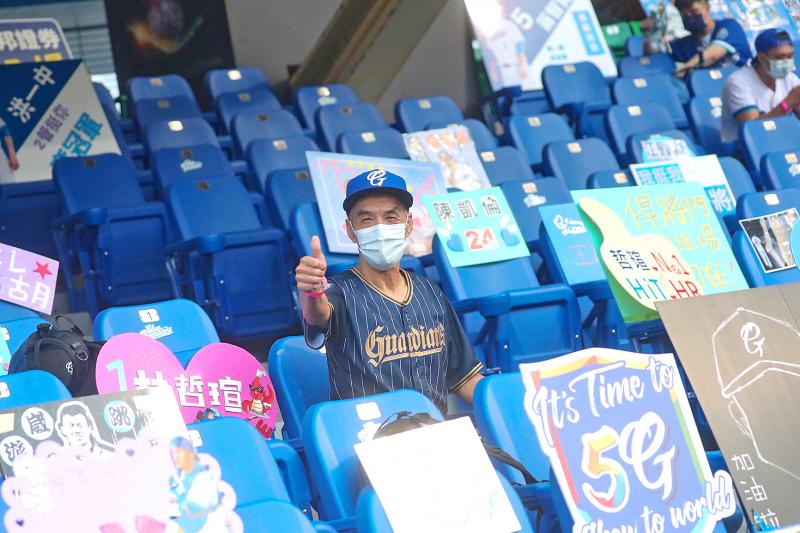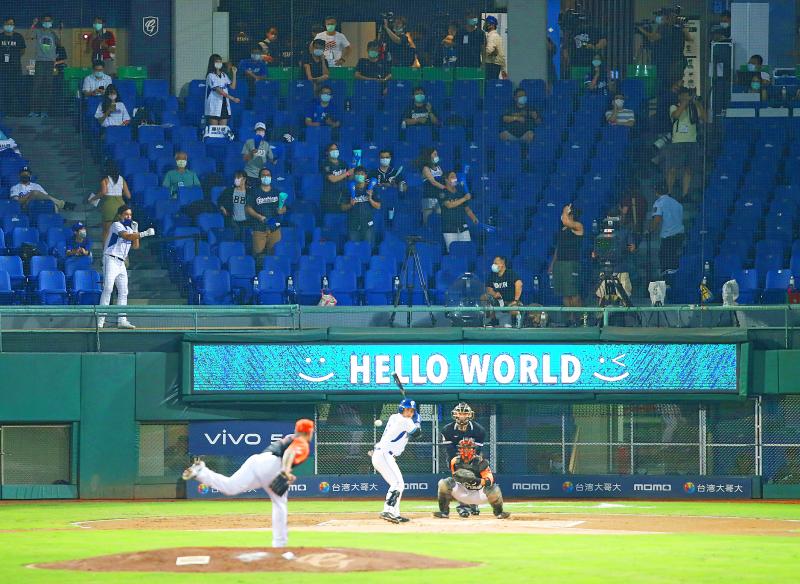Two Taiwanese ballparks yesterday became the world’s first to be opened to spectators for professional baseball this year, underscoring the nation’s success in containing the COVID-19 pandemic.
The CPBL games had the visiting Uni-President Lions facing the Fubon Guardians at the Sinjhuang Stadium in New Taipei City, while the CTBC Brothers hosted the Rakuten Monkeys at the Intercontinental Stadium in Taichung.
The Guardians hanged on for a 7-6 win after the Lions scored four runs in the top of the eighth.

Photo: CNA
Fubon’s Chiang Chih-hsien hit a solo dinger in the fifth against American pitcher Ryan Feierabend and the Lions’ Chen Yung-chi blasted a three-run homer in the eighth against Fubon’s relief pitching.
In the night’s other contest, the Brothers downed the Monkeys 6-4.
Health authorities on Wednesday said that ballparks could be opened to spectators as long as social distancing rules were enforced, as restrictions are being eased across society. That ended nearly a month of shuttered gates.

Photo: CNA
The CPBL season began on April 12, also a world first for pro baseball this year.
Minister of Health and Welfare Chen Shih-chung (陳時中) and New Taipei City Mayor Hou You-yi (侯友宜) attended the game in Sinjhuang to ensure proper prevention measures were observed.
The ballclubs invited Chen as a special guest to address the players and fans.
As he walked to the infield, spectators gave him a standing ovation, with many calling: “Thank you, health minister.”
“Taiwan’s prevention measures to combat the pandemic situation had all of our citizens cooperating with diligent efforts to achieve our common goals,” Chen told the crowd. “Today we did not have any new cases ... and that means 26 straight days with zero local cases in Taiwan. This is due to the combined efforts of all of our citizens.”
“Because of these results, we can take the next step to opening up,” he said. “To do this, we have to implement a new lifestyle, which includes personal hygiene practices like washing hands, wearing masks, social distancing and temperature taking. These must be done well at all times.”
“Today we start with opening ballparks, but with limits and in phases,” he said. “Step by step, let us see if we can continue to contain the virus.”
“To maintain a good life, let us do this together,” Chen said. “We can have success in containing the outbreak, so let us cheer each other on.”
Fubon Guardians general manager Chris Tsai presented a bouquet to the minister, thanking him on behalf of sports fans for opening ballparks.
Fubon head coach Hong Yi-chung presented Chen with a placard, smaller versions of which were presented to each spectator and media personnel, to commemorate the occasion.
They read: “Congratulations on being the first fans to attend a baseball game this year.”
The CPBL, in consultation with health authorities, introduced disease prevention conditions for spectators, including advanced ticket purchases online with ID verification, a limit of 1,000 people in designated seats that are staggered for social distancing, mandatory masks, and no eating, although drinking water is allowed.
Cheering and flag waving are permitted.
People began lining up outside the Sinjhuang Stadium in the late afternoon, and temperatures were taken before entry. Seats and tables were set up where each person filled out a health declaration and their recent travel history. Staff checked tickets and IDs, and disinfectant was sprayed on spectators’ hands before they could enter the stadium.
Some spectators complained about the no-eating rule, saying that three hours is too long to go without food.
These games are a test and restrictions would be eased eventually, Chen said.
The eating ban is to prevent virus transmission through saliva, he added.
One fan surnamed Kuo told reporters that he would surely get hungry and would leave the stadium to buy food before returning to the game.

Intelligence agents have recorded 510,000 instances of “controversial information” being spread online by the Chinese Communist Party (CCP) so far this year, the National Security Bureau (NSB) said in a report yesterday, as it warned of artificial intelligence (AI) being employed to generate destabilizing misinformation. The bureau submitted a written report to the Legislative Yuan in preparation for National Security Bureau Director-General Tsai Ming-yen’s (蔡明彥) appearance before the Foreign Affairs and National Defense Committee today. The CCP has been using cognitive warfare to divide Taiwanese society by commenting on controversial issues such as Taiwan Semiconductor Manufacturing Co’s (TSMC, 台積電) investments in the

INVESTIGATION: The case is the latest instance of a DPP figure being implicated in an espionage network accused of allegedly leaking information to Chinese intelligence Democratic Progressive Party (DPP) member Ho Jen-chieh (何仁傑) was detained and held incommunicado yesterday on suspicion of spying for China during his tenure as assistant to then-minister of foreign affairs Joseph Wu (吳釗燮). The Taipei District Prosecutors’ Office said Ho was implicated during its investigation into alleged spying activities by former Presidential Office consultant Wu Shang-yu (吳尚雨). Prosecutors said there is reason to believe Ho breached the National Security Act (國家安全法) by leaking classified Ministry of Foreign Affairs information to Chinese intelligence. Following interrogation, prosecutors petitioned the Taipei District Court to detain Ho, citing concerns over potential collusion or tampering of evidence. The

‘COMPREHENSIVE PLAN’: Lin Chia-lung said that the government was ready to talk about a variety of issues, including investment in and purchases from the US The National Stabilization Fund (NSF) yesterday announced that it would step in to staunch stock market losses for the ninth time in the nation’s history. An NSF board meeting, originally scheduled for Monday next week, was moved to yesterday after stocks plummeted in the wake of US President Donald Trump’s announcement of 32 percent tariffs on Taiwan on Wednesday last week. Board members voted to support the stock market with the NT$500 billion (US$15.15 billion) fund, with injections of funds to begin as soon as today. The NSF in 2000 injected NT$120 billion to stabilize stocks, the most ever. The lowest amount it

NEGOTIATIONS: Taiwan has good relations with Washington and the outlook for the negotiations looks promising, Minister of Economic Affairs J.W. Kuo said Taiwan’s GDP growth this year is expected to decrease by 0.43 to 1.61 percentage points due to the effects of US tariffs, National Development Council (NDC) Minister Paul Liu (劉鏡清) said at a meeting of the legislature’s Economics Committee in Taipei yesterday, citing a preliminary estimate by a private research institution. Taiwan’s economy would be significantly affected by the 32 percent “reciprocal” tariffs slapped by the US, which took effect yesterday, Liu said, adding that GDP growth could fall below 3 percent and potentially even dip below 2 percent to 1.53 percent this year. The council has commissioned another institution